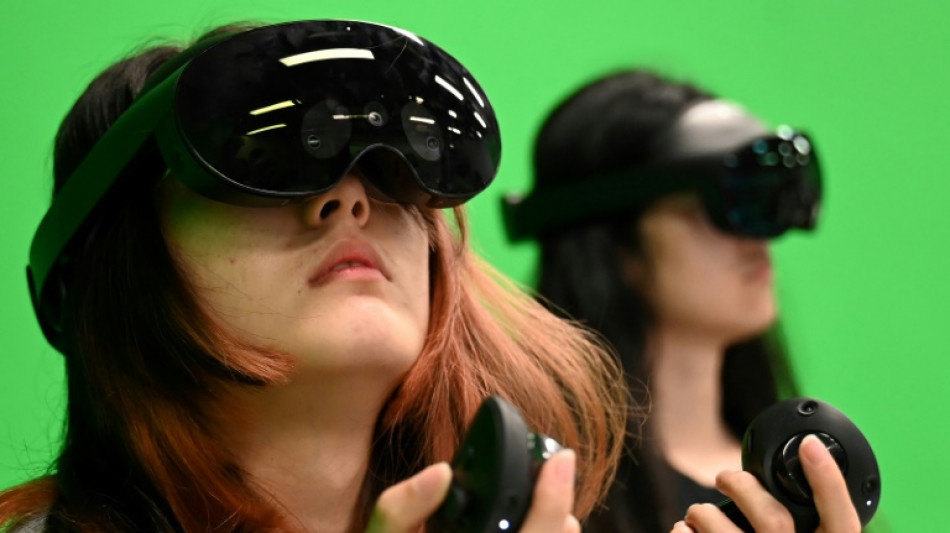
-
 France set to face New Zealand with second-string squad
France set to face New Zealand with second-string squad
-
Eyeing China, EU moves to ban 'high-risk' foreign suppliers from telecoms networks
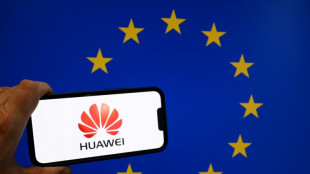
-
 Struggling Suryakumar will not adapt style to find form before T20 World Cup
Struggling Suryakumar will not adapt style to find form before T20 World Cup
-
World stocks sink, gold hits high on escalating trade war fears

-
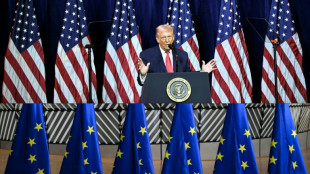 Easier said than done for US to apply tariffs on single EU states
Easier said than done for US to apply tariffs on single EU states
-
Canada military models response to US invasion: report

-
 Salah returns to Liverpool training after AFCON
Salah returns to Liverpool training after AFCON
-
Milan menswear shows add bling with brooches

-
 Scotland recall Gray, Cherry for Six Nations
Scotland recall Gray, Cherry for Six Nations
-
Scheib storms to Kronplatz giant slalom victory as Brignone impresses in World Cup return

-
 Chagos Islands: international dispute and human drama
Chagos Islands: international dispute and human drama
-
Thousands of farmers protest EU, Mercosur trade deal ahead of vote

-
 Men's Fashion Week kicks off in Paris with tributes for Valentino
Men's Fashion Week kicks off in Paris with tributes for Valentino
-
Lake named as captain as Wales unveil Six Nations squad

-
 Royals visit deadly train crash site as Spain mourns
Royals visit deadly train crash site as Spain mourns
-
Police, pro-Kurd protesters clash at Turkey border with Syria

-
 Thai forces razed Cambodian homes on border: rights group
Thai forces razed Cambodian homes on border: rights group
-
Jellyfish-inspired Osaka battles into Australian Open round two
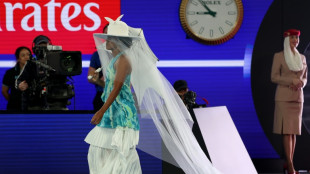
-
 Valentino taught us to respect women, says partner
Valentino taught us to respect women, says partner
-
Australia stiffens hate crime, gun laws after Bondi attack

-
 Mercedes chief designer Owen to leave F1 team
Mercedes chief designer Owen to leave F1 team
-
Trump unloads on allies as Davos showdown looms

-
 Moscow revels in Trump's Greenland plans but keeps concerns quiet
Moscow revels in Trump's Greenland plans but keeps concerns quiet
-
Global tourism hit new record level in 2025: UN

-
 Senegal poised to party with parade honouring AFCON champs
Senegal poised to party with parade honouring AFCON champs
-
Osaka emerges for Melbourne opener under hat, veil and parasol
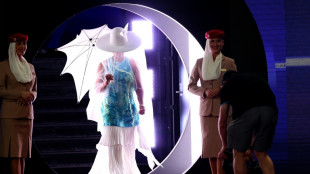
-
 Dogsled diplomacy in Greenland proves elusive for US
Dogsled diplomacy in Greenland proves elusive for US
-
Almost half of Kyiv without heat, power, after Russian attack

-
 EU vows 'unflinching' response to Trump's Greenland gambit
EU vows 'unflinching' response to Trump's Greenland gambit
-
Osaka steals show at Australian Open as Sinner strolls through

-
 Brignone impresses in first run of Kronplatz giant slalom in World Cup comeback
Brignone impresses in first run of Kronplatz giant slalom in World Cup comeback
-
Osaka emerges for Melbourne opener under white hat and umbrella
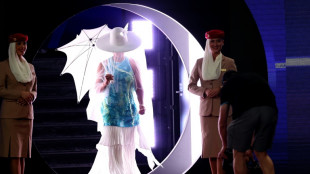
-
 Malawi suffers as US aid cuts cripple healthcare
Malawi suffers as US aid cuts cripple healthcare
-
Bessent says Europe dumping US debt over Greenland would 'defy logic'

-
 Freeze, please! China's winter swimmers take the plunge
Freeze, please! China's winter swimmers take the plunge
-
Talks between Damascus, Kurdish-led forces 'collapse': Kurdish official to AFP

-
 In-form Bencic makes light work of Boulter at Australian Open
In-form Bencic makes light work of Boulter at Australian Open
-
Spain mourns as train disaster toll rises to 41

-
 Sinner into Melbourne round two as opponent retires hurt
Sinner into Melbourne round two as opponent retires hurt
-
Israel begins demolitions at UNRWA headquarters in east Jerusalem

-
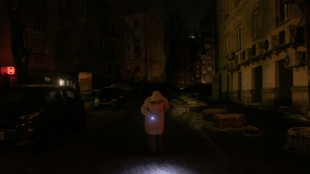 Almost half of Kyiv without heat, power, after Russian attack: govt
Almost half of Kyiv without heat, power, after Russian attack: govt
-
Veteran Monfils exits to standing ovation on Australian Open farewell

-
 Precision-serving former finalist Rybakina powers on in Melbourne
Precision-serving former finalist Rybakina powers on in Melbourne
-
South Korea's women footballers threaten boycott over conditions

-
 Equities sink, gold and silver hit records as Greenland fears mount
Equities sink, gold and silver hit records as Greenland fears mount
-
Australian lawmakers back stricter gun, hate crime laws

-
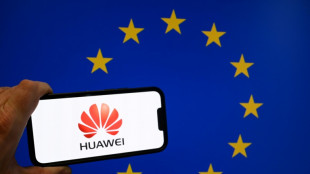 EU wants to keep Chinese suppliers out of critical infrastructure
EU wants to keep Chinese suppliers out of critical infrastructure
-
AI reshaping the battle over the narrative of Maduro's US capture

-
 Penguins bring forward breeding season as Antarctica warms: study
Penguins bring forward breeding season as Antarctica warms: study
-
Vietnam leader pledges graft fight as he eyes China-style powers

| RIO | -0.14% | 85.01 | $ | |
| CMSC | -0.17% | 23.44 | $ | |
| SCS | 0.12% | 16.14 | $ | |
| BTI | -2.5% | 56.8 | $ | |
| NGG | -0.63% | 80.38 | $ | |
| GSK | -0.34% | 48.055 | $ | |
| RBGPF | -1.87% | 82.5 | $ | |
| BCC | -2.13% | 83.724 | $ | |
| BCE | -0.19% | 24.095 | $ | |
| RYCEF | 0.06% | 17.06 | $ | |
| RELX | -2.51% | 40.61 | $ | |
| CMSD | -0.78% | 23.736 | $ | |
| BP | 0.18% | 35.445 | $ | |
| JRI | -0.22% | 13.67 | $ | |
| AZN | -4.41% | 90.439 | $ | |
| VOD | 0.26% | 13.505 | $ |

Einstein and anime: Hong Kong university tests AI professors
Using virtual reality headsets, students at a Hong Kong university travel to a pavilion above the clouds to watch an AI-generated Albert Einstein explain game theory.
The students are part of a course at the Hong Kong University of Science and Technology (HKUST) that is testing the use of "AI lecturers" as the artificial intelligence revolution hits campuses around the world.
The mass availability of tools such as ChatGPT has sparked optimism about new leaps in productivity and teaching, but also fears over cheating, plagiarism and the replacement of human instructors.
Professor Pan Hui, the project lead for HKUST's AI project, is not worried about being replaced by the tech and believes it can actually help ease what he described as a global shortage of teachers.
"AI teachers can bring in diversity, bring in an interesting aspect, and even immersive storytelling," Hui told AFP.
In his "Social Media for Creatives" course, AI-generated instructors teach 30 post-graduate students about immersive technologies and the impact of digital platforms.
These instructors are generated after presentation slides are fed into a programme. The looks, voices and gestures of the avatars can be customised, and they can be displayed on a screen or VR headsets.
This is mixed with in-person teaching by Hui, who says the system frees human lecturers from the "more tedious" parts of their job.
For student Lerry Yang, whose PhD research focuses on the metaverse, the advantage of AI lecturers was in the ability to tailor them to individual preferences and boost learning.
If the AI teacher "makes me feel more mentally receptive, or if it feels approachable and friendly, that erases the feeling of distance between me and the professor", she told AFP.
- 'Everybody's doing it' -
Educators around the world are grappling with the growing use of generative AI, from trying to reliably detect plagiarism to setting the boundaries for the use of such tools.
While initially hesitant, most Hong Kong universities last year allowed students to use AI to degrees that vary from course to course.
At HKUST, Hui is testing avatars with different genders and ethnic backgrounds, including the likenesses of renowned academic figures such as Einstein and the economist John Nash.
"So far, the most popular type of lecturers are young, beautiful ladies," Hui said.
An experiment with Japanese anime characters split opinion, said Christie Pang, a PhD student working with Hui on the project.
"Those who liked it really loved it. But some students felt they couldn't trust what (the lecturer) said," she said.
There could be a future where AI teachers surpass humans in terms of trustworthiness, Hui said, though he said he preferred a mix of the two.
"We as university teachers will better take care of our students in, for example, their emotional intelligence, creativity and critical thinking," he said.
For now, despite the wow factor for students, the technology is far from the level where it could pose a serious threat to human teachers.
It cannot interact with students or answer questions and like all AI-powered content generators, it can offer false, even bizarre answers -- sometimes called "hallucinations".
In a survey of more than 400 students last year, University of Hong Kong professor Cecilia Chan found that respondents preferred humans over digital avatars.
"(Students) still prefer to talk to a real person, because a real teacher would provide their own experience, feedback and empathy," said Chan, who researches the intersection of AI and education.
"Would you prefer to hear from a computer 'Well done'?"
That said, students are already using AI tools to help them learn, Chan added.
"Everybody's doing it."
At HKUST, Hui's student Yang echoed that view: "You just can't go against the advancement of this technology."
I.Stoeckli--VB



